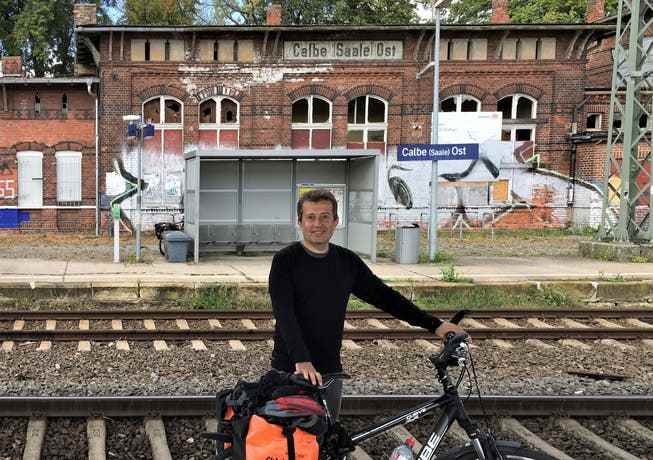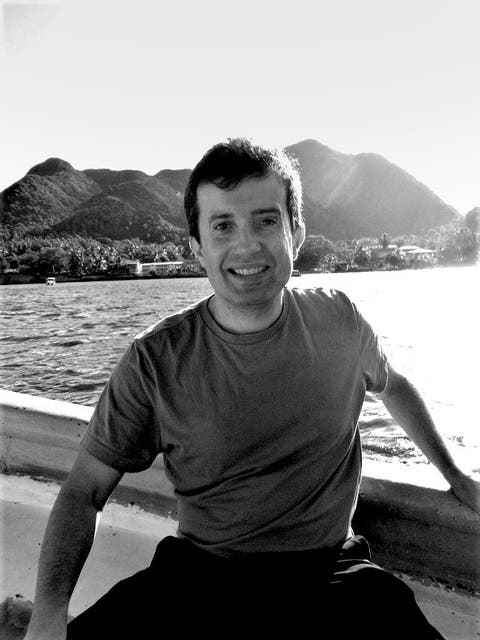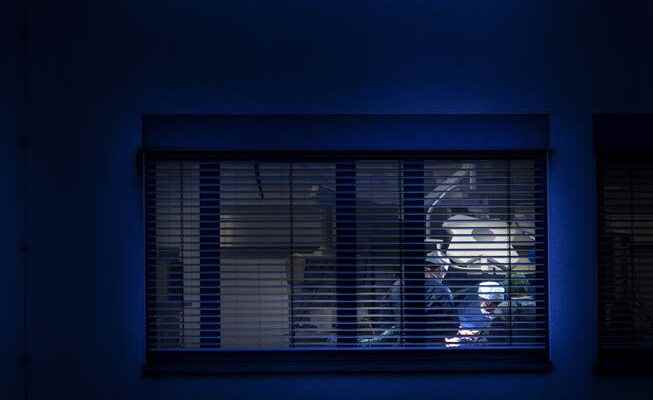Corona rules should save lives. But they also had bad side effects. An East German clinic refused Florian Graedler treatment. Half a year later he was dead.
In winter 2021, the 2-G rule for visitors applied across the board in German hospitals and, in some cases, vaccination or testing was compulsory for patients.
“Hello,” says Florian Graedler in April 2021. A word that sounds like a greeting, but is actually a farewell. After that he can no longer speak. Hardly move. At most, use your eyelids to signal approval or rejection. On a Sunday at the end of May, the 51-year-old died in his parents’ house in Wasserburg, Bavaria.
Florian Graedler’s story consists of two parts. One part is what you probably have to call fate. The other part is the ruthlessness of the self-invented corona rules in some German hospitals.
Graedler is a specialist in DNA sequencing machines. He travels the world to train laboratory personnel in the use of these devices. He speaks five languages, has many friends, enjoys diving in his free time and is committed to protecting marine life.

Until his illness, Florian Graedler was a committed athlete.
Fate
The bad times begin for the molecular biologist in autumn 2019. His parents visit him in Vienna, and at dinner his son complains that he has trouble turning his head. An MRI reveals a finding that doctors should be punished for the choice of words: under Graedler’s skullcap there is a so-called “mass occupancy”. In his case, the extremely rare clivus chordoma tumor, which grows unpredictably and is difficult to treat. Only one in a million people falls ill with it, and across Europe there are only a few hundred diagnoses a year. And only a few specialized doctors.
An 18-month ordeal begins for Graedler, which healthy people can hardly imagine. Fear. Pains. Increasing Restrictions. A total of ten head operations, some of which last nine hours. Graedler tries to be an active patient. He looks for experts, he joins in, he throws himself into the therapies with motivation.
His upper cervical vertebrae are fractured, which means more pain, but if the vertebrae were bolted with titanium, additional radiation would be difficult. Graedler has to wear a corset for months to stabilize his cervical spine. He can hardly swallow, can hardly speak, becomes paralyzed in the face, one eye is drying out due to poor care.
“I want to live”
He is now being fed by a abdominal tube. Because of the increasing intracranial pressure, he needs drainage, suffers an epileptic seizure and temporarily falls into a coma.
Graedler contracted pneumonia and struggled to breathe. He agrees to an incision in the trachea – “I want to live,” he says – although he knows that this can damage the vocal cords and that if he can speak at all, he will only be able to do so through a tracheostomy tube. This cannula can only be opened for a short time at a time.
In one of those short moments he says his last word, “hello”. After hospital stays in Munich, Heidelberg, Bad Aibling, Essen, Berlin and Burgau, his parents took him home at their own risk. At least the fight ends in the circle of family and friends. At least that.
He was human, he was her son, now he’s dead
Gisela Graedler, Florian’s mother, thought for a long time whether she should make her experiences public, at first the grief was too great, then her husband also had cancer. But she can’t get rid of the memories, Florian’s helpless desperation, his feeling of total abandonment.

Florian Graedler on vacation, in a boat at sea.
She wants things like this to stop happening in German hospitals. She brought photos of a suntanned athlete, laughing, in a boat on a turquoise sea. Florian, she says, had a nice apartment right behind the Munich university, and he cooked excellent paella. He was human, he was her son, and now he’s dead. The last photo is of his grave.
Gisela Graedler knows that part one of the story would have been bad enough, fate. But that would have been a private matter. Part two of the story is political.
“Now don’t get snotty”
Part two tells of bans on visiting a person who can no longer make phone calls, write or express themselves. From rehabilitation clinics that do not allow relatives to see a seriously ill person even with vaccinations, tests and masks.
This has happened thousands of times in Germany, tens of thousands of times. Every case was different, every case was unbearable. Only the bureaucratic justifications were the same: Those are the rules. I only do what I’m told. I don’t make the rules. Now don’t get snotty!
“Of course everyone was overloaded,” says Gisela Graedler: “But the clinics are no longer subject to any social controls if nobody is allowed in.” She calls a rehabilitation facility to inquire about her son’s condition. “I’m so afraid that he will die alone,” she says on the phone. “Maybe that would also be a solution,” replies the nurse who reached her inside.
Protection against foreign virus carriers
In their opinion, the Graedlers had the worst experience with the Greifswald University Clinic, that was in December 2020, during the second German lockdown. Since the beginning of the pandemic, the federal state of Mecklenburg-Western Pomerania has distinguished itself with a policy of sealing off possible virus carriers from abroad, be they tourists, be they owners of second homes or patients.
Florian Graedler, who is getting worse and worse, found out the name of an expert in whom he places his last hopes through the Chordoma Foundation, which helps those affected by the rare disease: Henry Schroeder from the clinic in Greifswald. “I’m in a desperate situation,” Graedler wrote to the professor and described the course of his illness. The neurosurgeon agrees to perform the procedure.
But the clinic management refuses to admit the patient – the corona crisis team decided against it, the clinic boss writes in an e-mail. The legal department seconded: The seriously ill could not be admitted because “due to the known current situation” it was impossible “Dr. Graedler (. . .) and other patients* to provide the best possible care». From the written statements of the clinic it is clear that they feel responsible above all for local patients and believe that Graedler can certainly find suitable doctors in his home country of Bavaria. But the terminally ill patient has already completed an odyssey through many German hospitals.
Legally, there is nothing against treatment
It’s possible that this last attempt would have been in vain, says Gisela Graedler: “But rejecting a person in such a situation, I could not have imagined that.”
The lawyer, with whom Florian Graedler is still looking for support at the last moment, writes to the clinic that he is not aware of any legal regulation “according to which the clinics in Mecklenburg-Western Pomerania are prohibited from treating patients who reside outside of Mecklenburg-Western Pomerania to be admitted to their homes for treatment. (. . .) In my opinion, the new Corona state ordinance in particular does not prevent the clinics from offering appropriate treatment, even if intensive care beds are occupied as a result.”
The university clinic cannot justify its decision with the relevant state ordinance, at most with its own rules – or with the argument that every single intensive care bed is occupied.
“Intensive discussion” about “understandable concerns”
According to a press release from the hospital dated January 3, 2021, this is not the case. In the answer to the lawyer there are rather general references to the crisis team, the ethics committee and the possibility of being treated “on site” at home.
The NZZ asks to speak to a member of the ethics committee who, according to the legal department, is involved in the “intensive discussion” about the “understandable concern of Dr. Graedlers». The clinic refuses.
The question also remains unanswered as to whether, given today’s knowledge of the course of the pandemic, the same decision would be made again in such a dramatic case.
The clinic does not want to comment on its own behavior during the Corona period. The press office only says that in order to be able to provide any information at all, they need a release from the duty of confidentiality: from the duty to remain silent about a patient who has never been treated in Greifswald. The deceased should have granted this power of attorney himself before his death.
